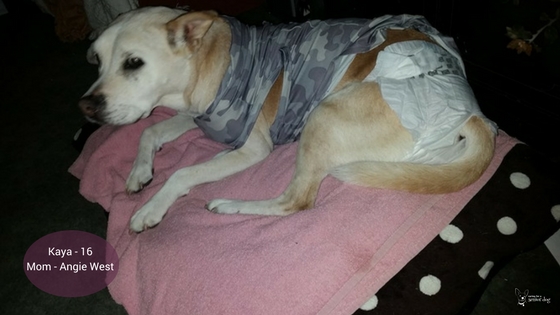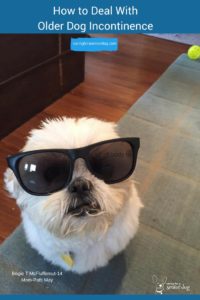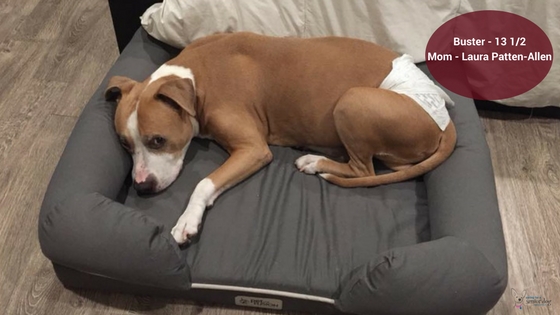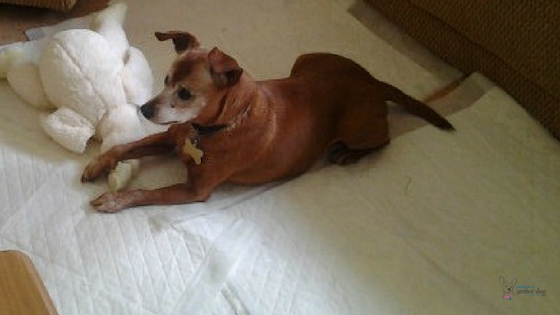
Let’s kick off this discussion about how to deal with older dog incontinence with a definition of what “incontinence” actually means.
According to the Merriam-Webster dictionary incontinence is the “inability of the body to control the evacuative functions of urination or defecation: partial or complete loss of bladder or bowel control.”
It’s hard on your dog too!
Believe it or not, as frustrating as this condition may be for humans at times, it’s hard on dogs as well. They can feel embarrassed at these accidents so minimizing them will do wonders for everyone involved!

Possible causes of old dog incontinence
- Urinary tract infection
- Weak bladder
- Medications such as prednisone, furosemide and phenobarbital
- Diabetes
- Cushings
- Kidney disease
- Arthritis – it’s too painful to crouch so she’s not always “finished” outside
- Canine cognitive dysfunction (doggy dementia) – your pup either forgets his training or just pees or poops when the urge arises, like my dog Red
- Hormonal imbalance
- Neurologic disorders affecting the nerve supply to the bladder
- Spinal issues/injuries/paralysis

Signs your dog may be incontinent
- Excessive drinking (could be a sign of kidney issues or diabetes)
- Leaking
- Blood in the urine
- Free flowing urine
- Halting urine
- Licking or excessive licking of the vulva or penis area (irritation or infection)
- You notice a urine smell on your dog’s bed/find a wet bed or blanket
Is it really incontinence?
It’s important to establish whether a dog really is incontinent or just experiencing an increased need to pee. Diabetes, Kidney issues, Cushings, and some medications can increase the amount of urine produced, hence theneed to pee more.
However things like cystitis, bladder stones and stones elsewhere in the urinary tract don’t cause an increase in volume of urine but do increase the urge to pee.

How is it diagnosed?
The only way is for your dog to have a check-up.
During the appointment your vet will want to know things like –
- What have you noticed your dog doing that has you concerned?
- How long has it been going on?
- Is he drinking more water?
- Is he going out less often for walks?
- Does he pee in larger amounts than usual?
- Any blood in the urine?
- Any other unusual behaviours?
Once your vet has had a chat he will do a general exam, probably take your dog’s temperature, will want a urine sample (maybe fecal if that’s also an issue), and likely a blood sample as well. Depending on the results your vet may also want to do x rays and perform an ultrasound. All this will help rule in, or out, various causes.
Before your appointment
I’m a firm believer in making notes before an appointment, if you have questions or concerns. Nerves and limited time with the vet means we have to get straight to the point quickly, so having everything written down ensures we don’t forget to mention anything important. In some cases videos can be useful.
It would be helpful if your vet knew how much water your dog drinks in a day, simply measure some into the bowl and keep track.
I also recommend bringing a urine sample because dogs never seem to pee when you need them to, and that can delay a diagnosis. The sample should be collected within two hours of seeing the vet.
Treatment options
The treatment will depend on the cause. It could be medication, hormone therapy or possibly surgery.
The two most commonly used drugs are phenylpropanolamine (helps strengthen the contraction of the urinary sphincter) and diethylstilbestrol (DES), hormone replacement therapy.
Some members of my Facebook group, Senior Dog Care Club, have had success with Proin, a drug which contains the active ingredient phenylpropanolamine. Another member mentioned a product called “Leaks No More” and she loved it.
Do not limit water intake
It makes sense if your dog drinks less he will pee less…right? Not necessarily. There are causes that have nothing to do with increased water consumption, plus they need water to survive! Discuss your dog’s water intake with your vet and see what he recommends.
Living with an incontinent dog
If your dog does not respond 100% to medication, there are plenty of ways to make things more manageable at home. Please have patience and understanding for what your dog is going through. Oh yeah, don’t forget the cleaning supplies!!
- Take your dog for more walks and pee breaks
- If it is medication related, your vet may be able to prescribe an alternative
- Pee pads – disposable and washable
- Belly bands – disposable and washable
- Doggy diapers – disposable and washable
- Baby diapers – disposable and washable
- Suspenders – to hold the diapers in place
- SleePee Time Bed
- Waterproof cover on his bed
Monitor your dog closely for signs of skin irritation from wearing a wet diaper for too long, or lying on a wet bed or blanket. Irritation can quickly become an infection.

How to deal with older dog incontinence – conclusion
I have come home to more pee stains than I can possibly count, so I feel your frustration. The thing is, it’s part of what we signed up for when we chose to become dog parents. It happens in humans, it happens in animals and that’s often part of the aging process.
The good news is there are treatments that can help, and if they don’t, or don’t work as well as we’d like, there are many other ways to manage this condition and still have a happy life together.
Get your FREE report – Tell Tail Signs Your Dog May Have Dementia
I would like to invite you to join Senior Dog Care Club, my Facebook group for senior dog parents. There you will find lots of helpful tips and advice, a place to ask questions and share experiences. I look forward to welcoming you.
*There are affiliate links in this post, which means if you purchase anything I make a few pennies…literally. That money helps me help homeless animals through donations and fostering.

 GingerLead Dog Support Harness Review
GingerLead Dog Support Harness Review
I can so relate to this article — my girls were about 14 when they began to have signs of incontinence – and we lived for almost a year and a half with it. Prion worked in the early stages — but not in those later months. But we do what we have to do to make them comfortable — and sure as heck never got mad at them!
Thanks for sharing your experience Jill. Although my dog isn’t incontinent per se, because of her dementia she no longer “waits” to go out but rather pees when she has to. My entire floor is covered in pee pads. Yes the messy look of it does give me some anxiety but what can you do. It’s part of what we signed up for isn’t it, and getting angry at our animals is not fair is it, they can’t help it!! Like you said we do what we have to do. Your girls were lucky they had you.
Hmm. Honestly incontinence is something I never gave thought too as a pet parent. I have experienced having a sick cat with a terminal illness so I have had the experience of coming home to pee outside the litterbox . Great post to share with dog owners with older pets and those suffering with incontinence. Thanks for explaining possible causes other than aging and also some solutions to try. Will pin this.
I never gave it much thought either, but it’s such a big issue among my FB group members I felt it was important to explore. Now with Red’s dementia getting worse it is something I’m dealing with as well. Thanks for pinning!
My senior cocker spaniel could be sleeping and would pee. I took her to the vet and he gave her pills that stopped it right away. It happens to spayed dogs sometimes. It was a hormone pill and she lived to be seventeen. She di develop dementia in the last year
I wish I could remember the hormone name. I know it had three letters .
Hi Gin. The hormone given is typically estrogen or related to it. I am glad to hear it helped your gal.
My sweet senior, Gracie, started drinking more water when I brought in our new dog Yoshi. Gracie does not like change and I think she was a little stressed. I was worried about her drinking more, since I know that it can be a symptom for several different medical issues. However, I had just had her senior bloodwork done and everything was normal. Since she was drinking more water, she did unfortunately have some accidents during the day while we were at work. Now that Yoshi has been here two and half weeks, I have noticed Gracie is drinking her normal amount again and seems to be adjusting to our new addition. I still put some pee pads in her crate just in case. Gracie is very healthy for a senior dog, but I know the older she gets we will likely have more issues like this. Your posts on caring for senior dogs really helps me to prepare for what we could encounter in the future.
I’m happy to hear Gracie has adapted to Yoshi sharing her house, and she’s starting to feel better. Pee pads are my lifesaver, I always say I wish I had bought stock in the company. It’s good to hear you find the posts helpful. Music to my ears!
I haven’t had to deal with this but it’s good information to know for the future. I knew about pads and bands and diapers but not the other options to help resolve the issue. It’s great there’s so many more solutions now.
Hopefully this won’t be an issue for Mr N but it’s comforting to know there are solutions.
Aww, this post makes me think of our old Chihuahua Nacho. He was 19 when he passed and had incontinence issues the last couple of years. Pee pads, lots of potty breaks, and hardwood floors were our friends. Great point about how that it bothers them too. Too many people turn to anger when their dogs pee in the house, instead of trying to remedy the situation and giving their dog the benefit of the doubt. Great post
Nacho was lucky he had such an understanding human to share his life with! Pee stains on the carpet really drive me crazy but I know it’s not Red’s fault. Her dementia has progressed so it’s all about understanding and lots and lots of pee pads!
I remember when a German Shepherd we had growing up got older and started having these issues. You could tell he was ashamed of himself, even though we didn’t give any indication that he had done something bad.
It’s funny how people say their dogs seem ashamed for having accidents. It never seems to bother my senior dog Red!!
These are some great tips!!! I am saving this article for when I am able to foster again. I have given serious thought to it, and think I am going to focus on fostering senior cases, for various reasons. I am not able to foster at the current moment, but when I do, this article will be super helpful. Thank you!!
Thank you I’m glad you think so!! Nothing more rewarding than fostering a senior dog, too many spend the last years of their life alone.
We haven’t had to deal with this, yet, as our dogs are still young, but these are all great points especially going to the vet prepared with notes, questions and even videos. Its good to know there’s a choice of treatments and products to help dogs and owners through this condition.
I’m a firm believer in preparing for a vet appointment, particularly if it’s a new issue you’re concerned about. Keeping notes means you won’t forget any questions or behaviours to mention, and videos in many instances can help your vet in ways words simply can’t. For me pee pads are the answer!
Very good, exhaustive article; love it. Cookie started having incontinence issues since she became about 2! Clearly, not an “old dog” incontinence; interestingly, it hasn’t gotten any worse so far. We’re managing with homeopathics and DES 1x to 2x a year.
Do you know why Cookie was having these issues? Is it something genetic? It’s good for everyone it hasn’t gotten worse, and I’m glad you found remedies that are helping. Do you mind me asking which ones you use?
Well, we don’t really. The working theory is because she was spayed too young; hormone-related incontinence. The estrogen supplementation helps some. But I’m not really buying that. Unfortunately, nothing else was ever found, including on ultrasound.
The other theory, which makes more sense to me, and perhaps those two causes play into each other, is the situation at her pelvic area and the nerves that control the sphincter. For that, we’re doing chiropractic, physio as well as we were experimenting with a holistic remedy specifically for that.
Neither of these theories explains why it started after she had the bout of pancreatitis. But that might have been just a coincidence. Who knows.
In spite of many diagnostic tools used, nothing concrete was found. Hormone-responsive incontinence is kind of a diagnosis of exclusion, really.
From my observation, it does seem to get worse when she does a lot of bouncing, whether through deep snow or tall grass; which would support the “nerve theory.”
Since the system we’ve been using works after a fashion, I’m leaving things alone unless something changes.
If the theory is she was spayed too young, I wonder about the incidence of incontinence in kittens and puppies spayed young at shelters? Although I was always a definitive answer for everything, perhaps in this case there won’t be one, but as long as you found a system that is helping, I would also leave well enough alone. No sense fiddling with something that’s working unless you have to.
I’m sorry Red is dealing with incontinence but you seem to have it well under control. This is really useful information, thanks for sharing.
Love & biscuits,
Dogs Luv Us and We Luv Them
Her incontinence is simply due to dementia, so my entire floor is covered in pee pads! Not the look I would normally go for, but what can you do!!